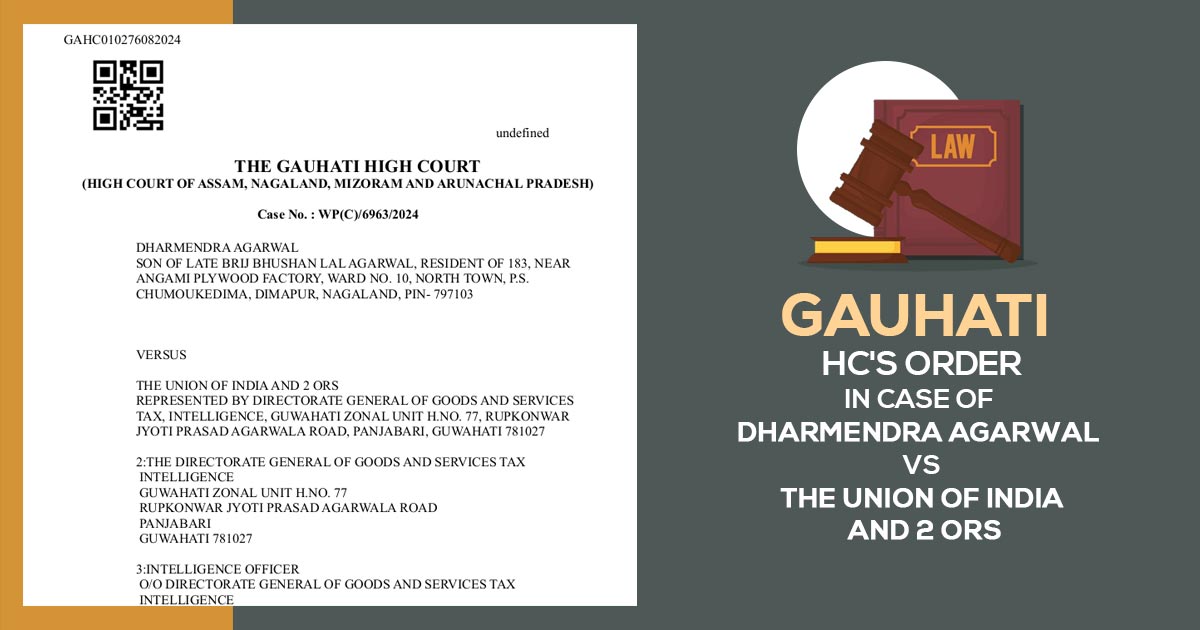
It was held by the Gauhati High Court that Section 69 of the Central Goods and Services Tax Act 2017, which grants the power to arrest a Commissioner under the Act, needs the authority to not only record ‘reasons to believe’ that a taxpayer committed the specified offence but also determine the necessity to arrest.
At the time of dealing with a writ petition contesting Petitioner’s arrest, Justice Soumitra Saikia observed, “The requirement under Sub-section (1) of Section 69 is to have “reasons to believe” that not only a person has committed any offence as specified but also as to why such person needs to be arrested.”
The bench determined that apart from the reference to the needs of section 41 of CrPC, no substantial incident was cited by the Principal Additional Director General recording any act or tries of tampering of proof via the applicant or threatening/ rendering any witnesses apart from not cooperating with the investigation.
The court in these situations said that the officer cannot have made a cause to assume that the applicant must be arrested.
Since December 12, 2024, the Petitioner was in custody for alleged evasion of GST by falsely claiming ITC of over ₹9 crore.
The applicant contesting the proceedings and his detention furnished that u/s 69 there is the power of detention considering that the actual quantum of demand has not been discovered to date, the assessments not have been finalized the applicant’s detention was inappropriate.
It was furnished that the applicant has cooperated with the related authorities and hence no need to keep him under detention is needed.
The GST departments’ standing counsel furnished that an authorization was duly issued via the Commissioner to the arrest and the detention of the applicant and the foundation of arrest has been expressed to the applicant.
He referred to the Supreme Court decision in State of the Gujarat Vs. Choodamani Parmeshwaran Iyer & Ors, (2023) to submit that powers under Article 226 of the Constitution do not need to be invoked to seek release of a person from detention.
At the outset, the High Court observed, “While there is no quarrel with the proposition that Section 69 does confer power on the Commissioner to order arrest in case any of the specified offences under Section 132 of the CGST Act, the question remains is whether arrest or detention is called for merely because is power is available on the authority to do so.”
It mentioned Arnab Manoranjan Goswami Vs. State of Maharastra (2021) where the Supreme Court carried that while assuming an application for the grant of bail, High Courts should consider factors like the chance of securing the presence of the accused, apprehension of the accused tampering with the witnesses, whether prima facie the ingredients of the offence are incurred, etc.
Read Also: Delhi HC: Telecom Towers Are Movable Properties and Eligible for GST Input Tax Credit
The court concerning the case observed that the applicant was summoned and he had been questioned and his statements were too recorded via the investigating authority.
“There is no prima facie finding seen from the records produced at this stage that the detention of the petitioner is necessary to prevent tampering of the evidence or that he is likely to cause any interference with the investigations carried on,” the Court said and granted him interim bail.
Within 4 weeks the Respondent-authority has been asked to submit its reply.
The case is next listed dated February 12.
| Case Title | Dharmendra Agarwal vs The Union of India and 2 ORS |
| Citation | WP(C)/6963/2024 |
| Date | 09.01.2025 |
| Counsel For Appellant | Mr. B K Mahajan, Mr. P Mahanta,Mr. P K Das,Mr. N Mahajan,Mr. D Bora,Mr. A Chaudhury Advocate |
| Counsel For Respondent | SC, GST |
| Gauhati High Court | Read Order |









